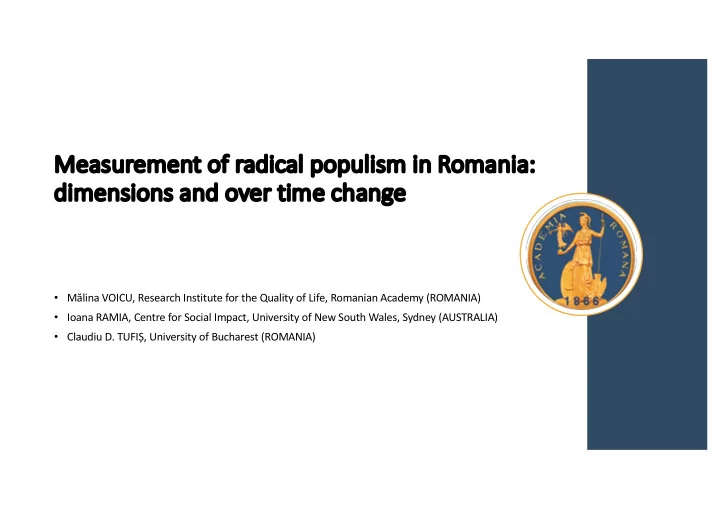

Me Measurement of radical populism in Romania: di dimens nsions ns and and over time chang change • Mălina VOICU, Research Institute for the Quality of Life, Romanian Academy (ROMANIA) • Ioana RAMIA, Centre for Social Impact, University of New South Wales, Sydney (AUSTRALIA) • Claudiu D. TUFIȘ, University of Bucharest (ROMANIA)
Re Research goals • How to measure populism as latent values orientation? • Is the measurement stable over time? Romanian case
Co Content • Theoretical background & hypotheses Ø Definition and dimensions of populism Ø Particularities of populism in Romania Ø Hypotheses • Data and methods • Variables • Results • Conclusions and limitations
Po Populism (1) Considers society to be ultimately separated into two homogeneous and antagonistic groups, ‘the pure people’ versus ‘the corrupt elite’, and which argues that politics should be an expression of the volonte generale of the people (Mudde, 2004: 543) Key concepts : • Inter-group boundary • Corruption • Elite versus ordinary citizens
Po Populism (2) Distrust all the traditional institutions of liberal democracy that stand between them and the wishes of the people (Bugaric, 2008: 192) Preference for technocrats and experts outside politics (Weyland, 1999) Key concepts: • Preference for technocrats
Po Populism (3) Two dimensions: • Anti-establishment • Preference for technocrats • Rejection of corruption • Direct democracy • Exclusionism : “us” against “others” • Minority (ethnic, religious, sexual) • Corrupt elite (Hameleers, de Vreese, 2018; Rooduijn, 2018)
Po Populism across nations and time • The combination of anti-establishment and exclusionism varies across nations (Bugaric, 2008; Hameleers, de Vreese, 2018) • Anti-establishment in Latin America • Exclusionism (targeting immigrants) in Western Europe
Po Populism in Romania (1) • Preference for Exclusionism as opposed to Anti-establishment (Bugaric, 2008; Shapire, 2008; Mişcoiu, 2010) • Inter-group border • Not so much against immigrants • Minority groups (ethnic, religious, sexual) (Dragoman, 2010) (H1) Intolerance towards minority groups and religious based groups relevant for populism
Variation over time? Attitude1 L1 Attitude2 Populism L2 L3 Attitude3 L1, L2, L3 may change in time of crises (Voicu and Duelmer, 2016)
Drivers of change • Mass media promoting public debate on refugees & terrorism (Hameleers, de Vreese, 2018) • Raising of social diversity More exclusivism • Societal pessimism • Distrust in institutions • Repeated failure of political system More anti-establishment (Steenvoorden, Harteveld, 2018; Steenvoorden, Wright, 2019)
Po Populism in Romania (2) • Issues in public debate: refugees & terrorism • Immigration: fast growth since 2010 Immigration 1991 2010 2012 2017 Permanent 1,602 7,059 21,684 50,199 Temporary 149,885 167,266 177,435 Total 156,944 188,950 227,634 +20% +20% (H2) Contribution of exclusionism to the measurement of populism grew between 2012 and 2018
Po Populism in Romania (3) • Romania = Italian style in fighting corruption (Mungiu-Pipidi, 2018) • Anti-corruption campaign was successful, but populist leaders proved to be corrupted. (H3) Corruption – key topic which became more relevant for populism
Da Data & me metho hod • World Values Survey Romania 2012 (n=1,503) and 2018 (n=1,257) • Structural Equation Models (SEM )
Measurement model: variables & de Me descriptives • When jobs are scarce, employers should give priority to people of this country over immigrants; intolerance towards outgroup (immi) 2012 2018 n % n % • Refuse as neighbours: People of a different race/ of different region/ immigrants (intol) immi 1077 73% 921 73% intol 523 36% 382 31% • The only acceptable religion is my religion (rel_good) gov_tec 1198 87% 938 83% rel_good 666 46% 429 38% • Having experts, not government, make decisions according to what they think is best for the country (gov_tec) corrupt (never justified) 1288 86% 994 81% people 644 44% 478 40% • Giving people more say in important government decisions (people) • Corruption is never justified (corrupt)
Co Control vari riables • Age: 30-44yo, 45-60yo, 60yo+ (dummy) • Education: no high school education, university degree (dummy) • Social Class: low class, working class (dummy) • Employment status: no employment (dummy)
Struct St ctural equation model Age Immigration e 1 Gender e 2 Intolerance No high school Rel good e 3 Populism University Corrupt e 4 e 6 Low class Gov tech e 5 Working class People e 6 No employmnt
Re Results 2012 SEM 2012 goodness of fit RMSEA 0.030 CFI 0.878 CD 0.379
Re Results 2018 SEM 2018 goodness of fit RMSEA 0.016 CFI 0.912 CD 0.390
2018 2012 Results: Populism constructs 2012 vs 2018 (unstandardized coefficients)
2012 2018 Results: Populism constructs 2012 vs 2018 (standardised coefficients)
Hy Hypoth thes esis chec eck (H1) Intolerance towards minority groups and religious based groups relevant for populism. þ • Intolerance and religion factors have the highest loadings in both 2012 and 2018. (H2) Contribution of exclusionism to the measurement of populism grew between 2012 and 2018. þ • immigration, intolerance, and beliefs that own religion is good have higher loadings (comparison of unstandardized results). (H3) Corruption – key topic which became more relevant for populism. x • While attitude towards corruption had a significant loading in 2012, this was no longer significant in 2018. May be interpreted in the context of recent political events.
Co Conclusions & furt rther r investigations • Measurement model changed from 2012 to 2018 • More exclusionism • Anti-establishment not related anymore with exclusionism • Proven by elections: anti-corruption vote was not related with exclusionism and not a populist one • Socio-demographics (age, education, class) no longer significant § External validation of voting preferences & trust in institutions to be added to the measurement model
Thank you! Email: malina.voicu@iccv.ro; i.ramia@unsw.edu.au ctufis@gmail.com
Recommend
More recommend